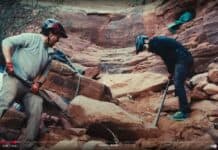The morning of Saturday, March 30, saw Poco Diablo Resort’s conference room filled with kids eager to meet wolves.
Apex Protection Project co-founder and Executive Director Paula Ficara explained to a focused audience how to act around their pack of wolves and wolfdogs. It was the last day of Sedona Wolf Week and one of the most exciting moments of the event was happening in just a few minutes: Children were about to not just see, but interact with real-life wolves and wolfdogs.
“Wolves are actually pretty shy,” Ficara explained, after listing the rules. “We want to remember that when we’re interacting with them.”
Before the talk was over, she opened space for questions. Ficara received interesting inquiries: “Do you feed wolves dog kibble or do you give them actual meat?” and “Why do wolves howl?”
She also heard some heartwarming comments: “I can’t believe wolves are out in the wild and I just care about them, they’re so cute and I love them” and “Wolves are being mean because they’re frightened.”
Then, it was time to go outside.
Although a little chaotic, it was a great day for Betsy Klein, co-founder of Plan B to Save Wolves, which co-produces Sedona Wolf Week alongside Apex Protection Project.
Retired Yellowstone National Park Ranger and wolf advocate Rick McIntyre was supposed to kick off the day’s events, but his flight got canceled and he didn’t land in Phoenix until 9 a.m., so his lecture had to be pushed for later.
The volunteer crew was still in high spirits, though, and not just because they would get to see some animals that day.
“Truthfully, it’s bigger and better than ever,” Klein
said of this year’s Sedona Wolf Week. “Everything has sold out that required a ticket, and the room has been full all week with the room listening to the free speaker presentations …. We feel this has been our biggest week ever.”
Seeing the children excited to meet and learn more about wolves also helped create the feeling that they are doing good work.
“We’re going to be counting on the younger generation to not only take care of wolves but all wildlife, the environment, this planet,” she said. “Kids are really taking an active role in where the future of humanity is going and I love seeing that. And that’s what we’re talking about, we’re not talking about just saving wolves, it’s a much broader concept … that kids today are embracing. I mean, they get it. It’s really thrilling to watch.”
“It’s amazing watching these children become advocates,” Klein added. “The biggest goal we want is for people to have an understanding of where wolves fit into the ecosystem but have a greater understanding that we’re connected to all things wild. And, because we are connected to all things wild, what we do that impacts them also impacts us.”
While she dealt with what was going on inside the conference room, Ficara supervised the meet and greets outside.
Divided into groups, the kids sat on the grass waiting for the wolfdogs to come out. Led on leashes by volunteers, the animals sniffed and walked around the children. Some were eager to be petted and went as far as trying to sit on their laps, others were shy and preferred to lie on the grass and observe.
As Ficara noted, most of the wolves in the U.S. that are being bred to be pets now have a little bit of dog in them, so some of the members of the pack looked a lot like Huskies.
Apex volunteer Cole McCandless explained to a group of kids they are usually mixed with Northern coldweather breeds, such as Malamutes.
Sisters Makayla, 10, and Anabelle George, 8, were part of the last group to interact with the wolves. They were visiting Sedona from Michigan with the parents and happened to see an ad for the Wolf Week.
“I was excited to get up and close to the wolves because I never got up and close to a wolf before,” Anabelle said, when asked what she thought of the event.
“It was really cool. I thought it was a good experience,” Makayla added.
The sisters compared the wolfdogs to their own puppy, with Makayla saying the Apex pack “acted like normal dogs almost just not as interactive and playful.”
And what did they learn?
“That it takes a while [for wolves] to trust each other,” Makayla said, with Anabelle agreeing.
“Don’t be afraid to try something new,” Makayla added, as an advice for other kids who would like to meet wolves. “And it’s a cool experience.”



















